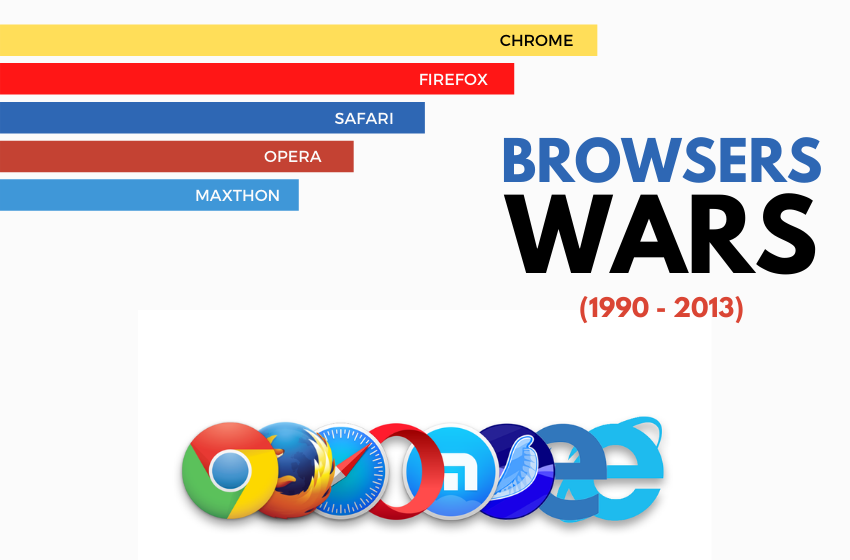In the era of the Internet there is a significant browser war that is occurring right before our eyes. A battle of supremacy, control and hold over the Internet it is the battle of the BROWSERS. With many contenders in the same battle arena there are exciting times ahead with one looking to go better and bigger than the other. With major players like Google Chrome, Mozilla Firefox, Internet Explorer things are certain to get heated up.
The Historical Context: How Browser Wars Began
The term “browser wars” originated in the late 1990s, during the intense competition between Netscape Navigator and Microsoft Internet Explorer (IE). Microsoft’s decision to bundle IE with Windows gave it a significant edge, eventually leading to the decline of Netscape and the emergence of IE as the dominant browser. This move, however, attracted antitrust scrutiny, leading to landmark legal battles that reshaped the tech industry.
Fall of Netscape and Rise of Internet Explorer
It all started in the 1990s when the major player in the browser arena was Netscape. Netscape’s navigator was the most popular way to surf the internet in the 1990s and gradually became the most dominant IPO at Wall Street in the 1990s. But this highly profitable and emerging market was identified by Microsoft the most dominating software company of those times. Microsoft with its abundance of cash and resources proved too strong an opponent for Netscape and with its new web browser Internet Explorer packed into its OS as a freebie it delivered a knock out punch to Netscape. Netscape did try to compete by adding new features to its navigator but it could not provide its browser for free and that led to its ultimate downfall and demise.
The modern era and the hard fought battle
But in the modern era of the Internet where the technology is not just limited to the PC but has also been incorporated into Laptops, Tablets and Mobile the playing field is much more even with many contenders fighting for the spotlight. The names notable among these are Google Chrome, Mozilla Firefox, Microsoft Edge, Safari who are continuously against one another in this war of supremacy.
The Current Browser Landscape
Today, the browser market is more diverse and dynamic. Here’s a look at the major players:
Google Chrome
- Market Leader: Chrome commands the largest market share globally due to its speed, reliability, and integration with Google’s ecosystem.
- Features: Robust extension library, cross-device sync, and frequent updates.
- Challenges: Critics often highlight its high memory usage and privacy concerns.
Mozilla Firefox
- Privacy Champion: Firefox remains popular for its commitment to open-source principles and user privacy.
- Key Features: Tracking protection, lightweight extensions, and customizability.
- Market Share: Although its market share has declined, it remains a favorite among privacy-conscious users.
Safari
- Apple Ecosystem: Safari dominates the Apple ecosystem, offering seamless integration with macOS and iOS.
- Strengths: Energy efficiency, privacy-focused features like Intelligent Tracking Prevention, and speed.
- Limitations: Limited availability outside of Apple devices.
Microsoft Edge
- A Comeback Story: Built on the Chromium engine, Microsoft Edge has rebranded itself as a modern, efficient browser.
- Unique Features: Collections for research, vertical tabs, and strong integration with Windows.
- Adoption: While gaining traction, it still lags behind Chrome and Safari in market share.
No matter who wins the battle the Consumers will always be a win-win with better, faster and feature loaded browsers. Let the BATTLE BEGIN.
Emerging Players and Niche Browsers
The browser space is no longer limited to the big names. Innovative browsers like Brave focus on privacy, offering built-in ad blockers and cryptocurrency integration. Meanwhile, Vivaldi appeals to power users with advanced customization options.
Mobile vs. Desktop Browsing
The rise of mobile internet usage has shifted the focus of browser developers. While Chrome and Safari dominate on mobile devices, other browsers like Samsung Internet and Opera Mini cater to specific user needs, such as low data consumption.
The Role of SEO and Web Compatibility
For content creators and developers, browser performance on speed, security, and compatibility is crucial. Modern browsers prioritize compliance with web standards, ensuring a smooth user experience.
Future of Browser Wars
The next phase of the browser wars will likely focus on:
- Privacy Innovations: Responding to growing user demand for data security.
- AI Integration: Features like predictive search and intelligent suggestions.
- Cross-Platform Accessibility: Seamless transitions between devices and operating systems.
Also Read: Should Students get Limited Access to the Internet?
Related Links:
Today’s Technology Closing the gap between Tablets and Laptops
Macbook Pro: How is it better than the rest?
Slow Demise of the Desktop
Smartphone Browsing – The new way to Internet access

